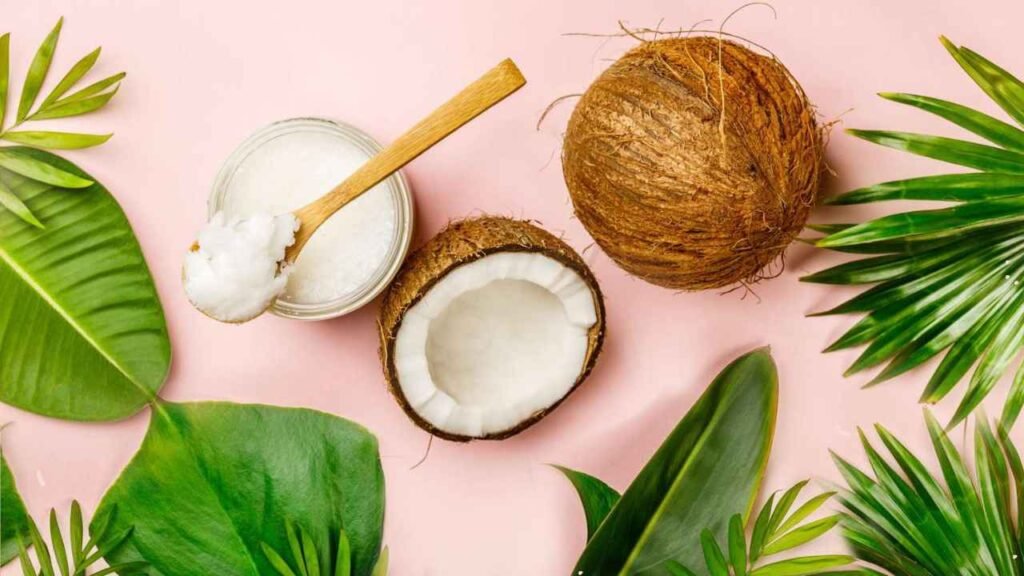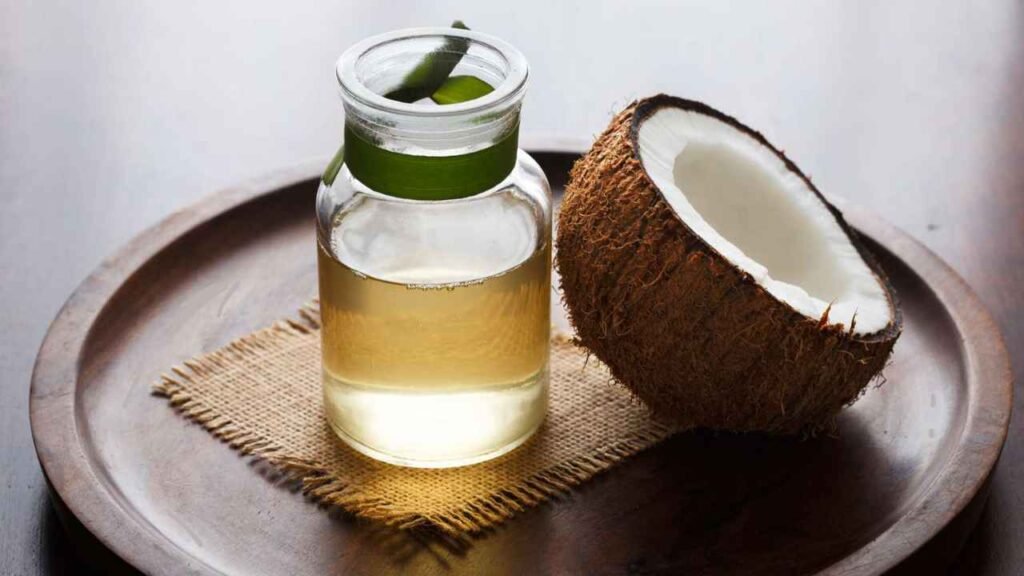Coconut essential oil for skin, derived from the kernels of coconuts, is a natural elixir cherished for its versatile benefits in skincare. Its origins trace back centuries, where various cultures recognized its potency in enhancing skin health and beauty. Utilize it in diffuser for optimal results.
Benefits of Coconut Essential Oil for Skin
Moisturizing Properties: Coconut oil is a powerful natural moisturizer due to its high concentration of fatty acids. It helps to hydrate and nourish the skin, making it an excellent choice for dry skin types.
Skin Barrier Enhancement: The fatty acids present in coconut oil, such as lauric acid, help strengthen the skin’s protective barrier. This can potentially assist in retaining moisture and shielding the skin from environmental stressors.
Antibacterial and Antifungal Qualities: Coconut oil contains properties like caprylic acid and lauric acid, which possess antimicrobial properties. They may help combat bacteria, fungi, and other microbes, making it beneficial for conditions like acne and certain skin infections.
Anti-inflammatory Effects: Coconut oil has anti-inflammatory properties that can assist in calming irritated or inflamed skin. It might be helpful for conditions like eczema, psoriasis, or sunburn when applied topically.
Antioxidant Content: It contains antioxidants like vitamin E, which can help protect the skin from oxidative stress caused by free radicals. This may contribute to reducing signs of aging and maintaining a youthful appearance.

Wound Healing: Some studies suggest that coconut oil might aid in wound healing due to its antimicrobial and moisturizing properties. However, it’s essential to consult a healthcare professional before using it on open wounds.
Improves Skin Texture: Regular application of coconut oil can help improve skin texture, making it softer and smoother over time.
Different Uses of Coconut Essential Oil for Skin Care
Moisturizer
Using Coconut Essential Oil for Skin as a natural moisturizer by applying a small amount to clean skin. Its hydrating properties can help keep your skin soft and supple. However, use sparingly, especially if you have oily skin, as it can be heavy.
Makeup Remover
Dab a small amount of coconut oil onto a cotton pad and gently wipe away makeup. It effectively breaks down makeup, even stubborn waterproof products, while hydrating the skin.
Body Oil
After a shower or bath, apply coconut oil all over your body to lock in moisture. It can help prevent dryness and leave your skin feeling smooth.
Lip Balm
Apply a tiny amount of coconut oil to chapped lips to moisturize and soothe them. Its emollient properties can help soften and hydrate dry, flaky lips.
Cuticle Oil
Massage a small amount of coconut oil into your cuticles to soften and moisturize them. This can help promote healthy nail growth and prevent hangnails.
Shaving Cream Alternative
Apply coconut oil to damp skin before shaving to create a smooth surface. It can provide lubrication, reducing friction and preventing irritation.
Body Scrub
Mix coconut oil with natural exfoliants like sugar or salt to create a DIY body scrub. Gently massage this mixture onto damp skin to exfoliate and soften rough areas.
Massage Oil
Due to its texture and moisturizing properties, coconut oil can be used as a massage oil. It helps to lubricate the skin, making massage strokes smoother and more comfortable.
After-Sun Care
Apply Coconut Essential Oil for Skin to sun-exposed skin to soothe and hydrate after spending time outdoors. It can provide relief for sunburned or irritated skin.
How to Choose and Use Coconut Essential Oil for Skin?
Organic Certification: Look for coconut oil labeled as “organic.” Organic certification indicates that the coconuts used to produce the oil were grown without synthetic pesticides or fertilizers, ensuring a purer product for your skin.
Cold-Pressed Method: Opt for coconut Essential Oil for Skin that is cold-pressed. This extraction method involves pressing the coconut meat at low temperatures, preserving its natural nutrients and properties. Cold-pressed oils typically retain more beneficial compounds compared to heat-processed varieties.

Unrefined or Virgin Coconut Oil: Choose unrefined or virgin coconut oil. These types are minimally processed and undergo less refining, retaining more of the natural antioxidants, vitamins, and moisturizing qualities that are beneficial for the skin.
Check Ingredients: Ensure the product contains only coconut oil without any added synthetic fragrances, preservatives, or other additives. Pure Coconut Essential Oil for Skin should be the sole ingredient listed on the label.
Perform Patch Tests: Before using coconut oil widely, perform a patch test on a small area of your skin to check for any adverse reactions or allergies. Apply a small amount of oil to your inner forearm or behind your ear and wait 24 hours to see if any irritation occurs.
Use Sparingly: Coconut oil can be quite rich, so a little goes a long way. Apply it sparingly to avoid a greasy feeling on the skin. Start with a small amount and adjust based on how your skin responds.
Storage: Proper storage is crucial. Keep your Coconut Essential Oil for Skin in a cool, dry place away from direct sunlight to maintain its freshness and effectiveness.
Comparative Analysis with Other Essential Oils for Skin
When compared with jojoba or argan oils, Coconut Essential Oil for Skin stands out for its unique composition and multifaceted benefits for skin health.
Myths and Misconceptions About Coconut Essential Oil for Skin
It’s important to do thorough research, consult with experts or healthcare professionals, and follow proper guidelines when using coconut essential oil or any essential oils for various purposes. Safety precautions, proper dilution, and understanding individual sensitivities are crucial for reaping the benefits while minimizing risks associated with essential oil usage.
Testimonials and User Experiences
Real-life anecdotes highlighting positive experiences with Coconut Essential Oil for Skin reinforce its credibility as a skincare staple.
- Sarah, a skincare enthusiast, had struggled with dry and irritated skin for years. She decided to incorporate coconut essential oil into her skincare routine after researching its benefits. Mixing a few drops of pure coconut essential oil with her favorite unscented lotion, she applied it to her skin daily. Over time, she noticed a significant improvement in her skin’s hydration and texture. The oil helped soothe the dryness and reduced redness, leaving her skin feeling softer and more nourished.
- David had been dealing with occasional breakouts and acne scars on his face. After reading about the antimicrobial properties of coconut essential oil, he diluted a small amount in a carrier oil and used it as a spot treatment on his blemishes. Surprisingly, he noticed that the application of coconut essential oil helped in reducing the size and redness of his acne. With consistent use, the appearance of his acne scars diminished, giving him smoother and clearer skin.
Potential Future Innovations with Coconut Essential Oil
Ongoing research explores potential Coconut Essential Oil for Skincare innovation. Scientists are combining it with other natural elements for targeted solutions while investigating nanotechnology for enhanced stability and skin penetration. Clinical studies aim to validate its anti-inflammatory and moisturizing properties. Personalized skincare options and sustainable sourcing highlight future directions for this versatile ingredient.
Conclusion
Coconut Essential Oil for Skin embodies nature’s bounty, offering a plethora of skin-enhancing benefits. Its versatility, backed by scientific evidence and user experiences, makes it a cherished addition to skincare regimens worldwide.
1. Is coconut essential oil suitable for all skin types?
Coconut essential oil might not be suitable for all skin types. While some people find it beneficial, others may experience adverse reactions. It can be comedogenic, potentially causing pore blockage in certain individuals, particularly those with oily or acne-prone skin.
2. Can coconut essential oil clog pores?
Coconut essential oil has the potential to clog pores, especially for individuals with skin prone to clogged pores or acne. This comedogenic property varies among individuals, so patch testing is advisable before using it on larger areas of the skin, especially the face.
3. How often should one apply coconut essential oil for optimal results?
There isn’t a one-size-fits-all approach to how often one should apply coconut essential oil. It largely depends on individual skin tolerance and the intended use. Generally, using it sparingly and gradually increasing application frequency while monitoring skin reactions might help determine the optimal usage for individual skin types.
4.Are there any precautions to consider when using coconut essential oil?
Several precautions should be considered when using coconut essential oil. Always perform a patch test on a small area of skin to check for any allergic reactions or sensitivities. Dilute coconut essential oil with a carrier oil before applying it topically to minimize the risk of skin irritation.
Avoid using it on broken or sensitive skin areas without consulting a healthcare professional. Refrain from ingesting coconut essential oil without proper guidance from a qualified expert.
Does the scent of coconut essential oil linger on the skin?
The scent of coconut essential oil can linger on the skin for a certain period, but its intensity and longevity vary among different individuals. Some may find that the aroma dissipates relatively quickly, while others may notice a lingering fragrance for a more extended period after application.
Factors such as skin type, application method, and the specific brand or type of coconut essential oil used can influence how long the scent lasts on the skin.


1 Comment
[…] Explore: Coconut Essential Oil for Skin: 9 Different usage! […]